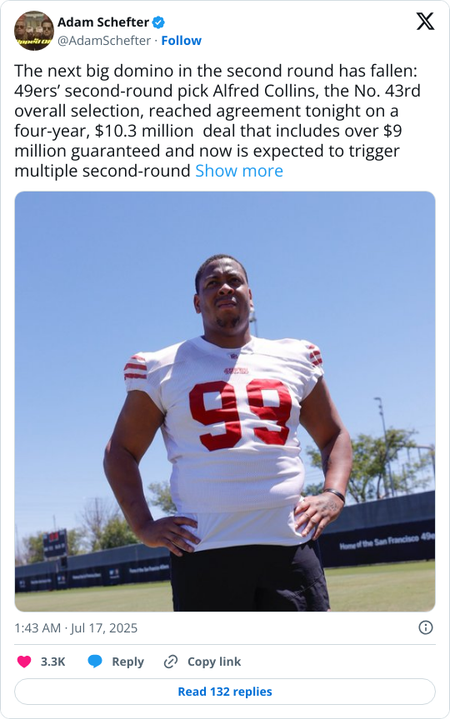| There’s some labor-relations tension stewing in the NFL intriguing enough to have me thinking about football in July. Since 2011, NFL rookies have all signed four-year contracts, the value of which is largely determined by their draft spot. No player picked outside of the first round had ever received a fully guaranteed deal — until this year, when the Houston Texans signed their second-round pick, wide receiver Jayden Higgins, to a fully guaranteed contract worth about $11.7 million. Suddenly, every second-round pick wanted the same thing. Cue the standoff. With training camps opening next week, a whopping 29 of the 32 second-round picks chosen in April’s draft have not yet signed their deals. There are several interesting things at play here, and not one of them is the result of this holdout. Everyone wants to get these deals done. Teams don’t want to have their prized draft picks deprived of precious reps, and from the players’ perspective, missing your first training camp can be a career killer. What’s likely to happen is more players will sign guaranteed deals. The question is how many.  | | | The juicy part in this standoff is in the context. This is all unfolding weeks after reporter Pablo Torre unearthed documents revealing how unified NFL owners have been in recent years in their efforts to suppress guaranteed money (technically, no collusion was found, but that “technically” is doing a lot of work there). Then last week, ESPN reported that not only had the NFL Players Association known about said documents, but it struck a deal with the league to keep those documents under wraps for months! As you might imagine, players are, how should I say, ripping mad. And it seems agents — including agents of unsigned rookies selected in the second round — are pushing back. But the unsigned rookies have a fascinating role here, too, one that speaks to how the NIL generation of athletes understands its leverage differently from its predecessors. In the past, second-round picks have generally been eager to sign contracts, and at the mercy of whatever they were offered, because many of them didn’t have much money coming out of school. Now that many of these rookies earned cash playing for college programs, there’s an argument that they can afford to hold out for what they think they deserve. That’s happening on a larger scale with Cincinnati Bengals first-round pick Shemar Stewart, who is holding off on signing his deal over some very specific contract language that, again, deals with guaranteed money. It might take some legal action, but in Stewart’s case, he is holding open the possibility that he could even return to playing college football (presumably for a pretty penny). Also, on the leverage front? Teams can fine players under contract who miss time while holding out for a new deal (hello, Terry McLaurin). Unsigned players aren’t subject to such punishment. Now, again, we’re talking about the NFL ― the biggest, surest, most draconian business in sports. This struggle over guaranteed money wouldn’t be happening in other leagues, because the NFL is the only major North American sports league that does not offer guaranteed contracts at least for its veteran players. Teams and players are going to work this out, and ultimately, the league will prosper. But any time the rope in this tug-of-war between players and owners pulls even an inch in the direction of the players, my ears perk up. Even in July. |